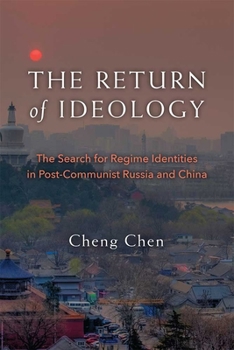The Return of Ideology: The Search for Regime Identities in Postcommunist Russia and China
As a nation makes the transition from communism to democracy or another form of authoritarianism, its regime must construct not only new political institutions, but also a new political ideology that can guide policy and provide a sense of mission. The new ideology is crucial for legitimacy at home and abroad, as well as the regime's long-term viability. In The Return of Ideology , Cheng Chen compares post-communist regimes, with a focus on Russia under Putin and post-Deng China, investigating the factors that affect the success of an ideology-building project and identifies the implications for international affairs. Successful ideology-building requires two necessary--but not sufficient--conditions. The regime must establish a coherent ideological repertoire that takes into account the nation's ideological heritage and fresh surges of nationalism. Also, the regime must attract and maintain a strong commitment to the emerging ideology among the political elite. Drawing on rich primary sources, including interviews, surveys, political speeches, writings of political leaders, and a variety of publications, Chen identifies the major obstacles to ideology-building in modern Russia and China and assesses their respective long-term prospects. Whereas creating a new regime ideology has been a protracted and difficult process in China, it has been even more so in Russia. The ability to forge an ideology is not merely a domestic concern for these two nations, but a matter of international import as these two great powers move to assert and extend their influence in the world.
Format:Hardcover
Language:English
ISBN:0472119931
ISBN13:9780472119936
Release Date:July 2016
Publisher:University of Michigan Press
Length:240 Pages
Weight:1.10 lbs.
Dimensions:0.9" x 6.1" x 9.1"
Customer Reviews
0 rating





